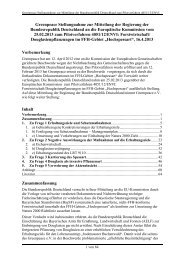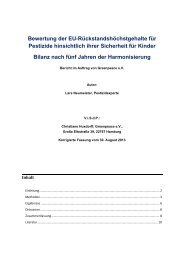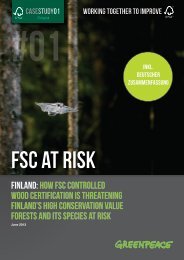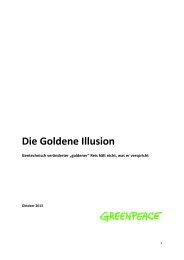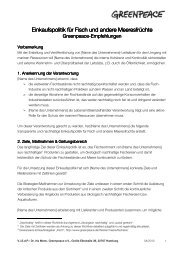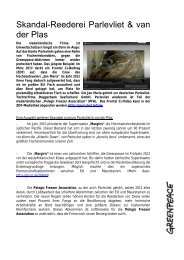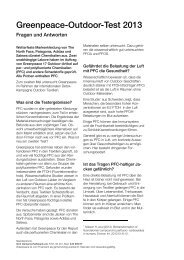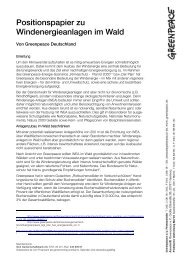Consuming Canada's Boreal Forest: The chain of ... - Greenpeace
Consuming Canada's Boreal Forest: The chain of ... - Greenpeace
Consuming Canada's Boreal Forest: The chain of ... - Greenpeace
Create successful ePaper yourself
Turn your PDF publications into a flip-book with our unique Google optimized e-Paper software.
<strong>Greenpeace</strong><br />
Not only are these companies impacting biodiversity values such as intactness and habitat<br />
for threatened wildlife, but there are serious climate change implications to their logging<br />
practices as well.<br />
Customers <strong>of</strong> these logging companies sell or consume copy, catalogue, magazine, book<br />
and newsprint papers, lumber and other finished wood products. In 2005, the value <strong>of</strong><br />
exports <strong>of</strong> these and other forest products from Canada to Europe and the United States<br />
totaled CDN$41.9 billion (US$37 billion). <strong>The</strong>y drive the destruction <strong>of</strong> the <strong>Boreal</strong> <strong>Forest</strong> and<br />
form an important link in the <strong>chain</strong>. After all, without demand there is no supply. This report<br />
pr<strong>of</strong>iles some <strong>of</strong> those customers, including Rona, Stora Enso, Best Buy, Hachette Books,<br />
Time Inc., Lowes, Land’s End/Sears, and OfficeMax.<br />
<strong>Greenpeace</strong> believes that customers <strong>of</strong> logging companies have a responsibility to protect<br />
ancient forests and can play a significant role in breaking the <strong>chain</strong> <strong>of</strong> destruction in the<br />
<strong>Boreal</strong> <strong>Forest</strong>. <strong>The</strong>re is increasing recognition that the marketplace can have a significant<br />
impact in shifting the way forestry is carried out on the ground and ending logging in intact<br />
forests. Individual consumers worldwide are increasingly demanding products that limit<br />
damage to the environment and this concern is reflected in the purchases they make. <strong>The</strong><br />
evidence for this is seen in the growth <strong>of</strong> the variety and amount <strong>of</strong> papers manufactured<br />
from recycled and <strong>Forest</strong> Stewardship Council (FSC)–certified materials and from lumber<br />
that is FSC-certified. Progressive companies in this regard have adopted strong procurement<br />
policies that apply to their global operations.<br />
One <strong>of</strong> the most effective ways to transform the practices <strong>of</strong> destructive logging companies<br />
is for corporate customers to demand responsible forestry certified to the standards <strong>of</strong> the<br />
FSC, and an end to logging in intact forest areas and habitats <strong>of</strong> endangered and threat-<br />
ened species. <strong>The</strong>y can do so by dialoguing with suppliers and ending purchases <strong>of</strong> pulp,<br />
paper and lumber from destructive logging companies. In the example <strong>of</strong> Canada’s Great<br />
Bear Rainforest in the province <strong>of</strong> British Columbia, we have seen what power the marketplace<br />
can have in protecting ancient forests globally and beginning to transform the logging<br />
industry. This same market engagement will shape the future <strong>of</strong> Canada’s <strong>Boreal</strong> <strong>Forest</strong>.<br />
<strong>Consuming</strong> <strong>Canada's</strong> <strong>Boreal</strong> <strong>Forest</strong>: <strong>The</strong> <strong>chain</strong> <strong>of</strong> destruction from logging companies to consumers<br />
05



